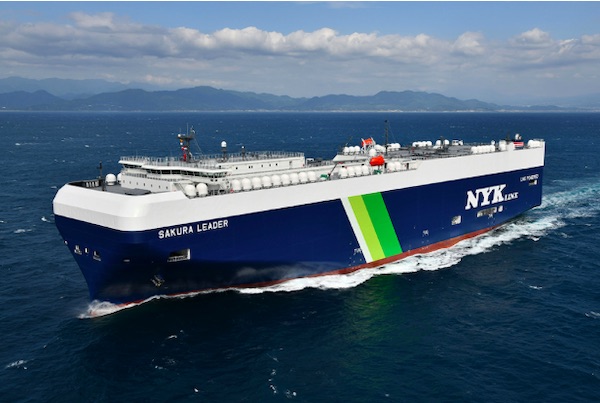First Japan-built LNG-fueled PCC with FGSS Supplied by Mitsubishi Shipbuilding Has Entered Service
- Written by ACN Newswire - Press Releases
|
|
| LNG-fueled PCC "SAKURA LEADER" |
|
|
| FGSS module |
Mitsubishi Shipbuilding supported the shipyard by providing the relevant engineering services and technical support relating to the gas handling of the LNG-fueled PCC, as well as dispatching highly experienced engineers for a part of installation work and the gas testing. Engineers were also dispatched last month during the LNG fueling, the first ship-to-ship bunkering in Japan. The same FGSS system is currently being manufactured for a second PCC, and is to be delivered next year as scheduled.
The ship has been designated by Japan's Ministry of the Environment and Ministry of Land, Infrastructure, Transport and Tourism (MLIT) as a model project to reduce CO2 emissions by using alternative fuel, and demonstrate substantial CO2 emission reduction technology during actual operation. The FGSS is expected to greatly contribute to the environmental performance of the ship not only by meeting the SOx (sulfur oxide) emission regulations implemented globally in 2020, but also by improving the energy efficiency (CO2 emissions per unit of transportation) of the ship by approximately 40%, far exceeding the International Maritime Organization (IMO) EEDI Phase 3 requirements(Note) that will come into effect in 2025.
The FGSS is an LNG fuel gas supply system developed by Mitsubishi Shipbuilding utilizing LNG and vaporized gas handling technology accumulated through its extensive experience with the construction of LNG carriers and has been verified for marine use based on experience in marine engine test facilities at engine manufacturers. The system comprises LNG fuel tanks, LNG fuel gas supply units, a control unit and other facilities, and is delivered in modules. This contributes to the optimum design of the cargo space and helps the shipyard shorten the installation period, as well as supports safe operation by customizing the control system and other aspects of the FGSS to meet the operational needs of the ship owner.
Going forward, by providing FGSS and related engineering services, as well as technical support for new buildings and conversions, Mitsubishi Shipbuilding will contribute to competitiveness for ship owners and operators, increase the added value of ships, and reduce the environmental load that is increasing worldwide.
EEDI Phase 3 requirements:Regulations on the energy efficiency of ships based on the 2013 revision of the International Convention on the Prevention of Ship Pollution 1997 Protocol (Appendix VI to the MARPOL Convention). EEDI (Energy Efficiency Design Index) is the number of grams of carbon dioxide (CO2) required to carry 1 ton of cargo for 1 mile, and the reduction rate from the baseline will be gradually enhanced. Car carriers are required to implement reductions of 5% by 2015 (Phase 1), 15% by 2020 (Phase 2), and 30% by 2025 (Phase 3).
Copyright 2020 JCN Newswire. All rights reserved. www.jcnnewswire.com
Authors: ACN Newswire - Press Releases
Read more //?#



